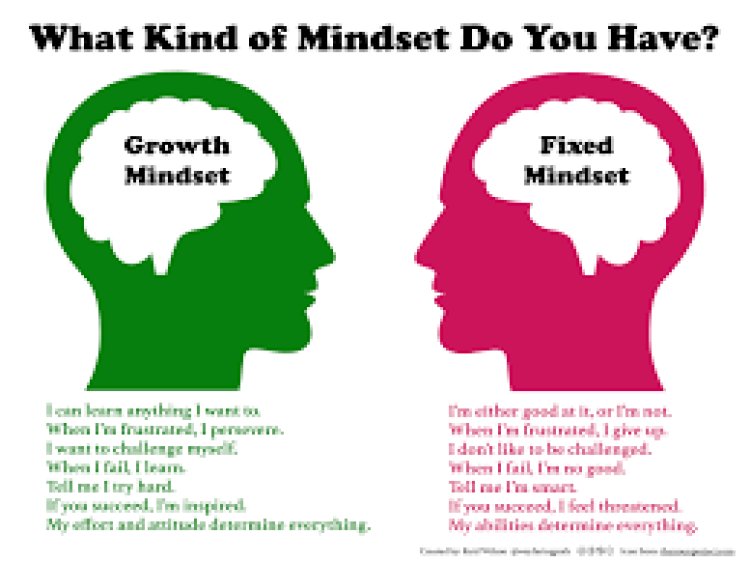12 Ways to Build a Growth Mindset
Want to increase your chances of success? Then develop your growth mindset.

What Is Growth Mindset?
Different points of view can either contribute to or detract from our health and happiness. Having a growth mindset means you think you can get better at anything by putting in the time and effort. This faith isn't so much based on magic. The problem is that we don't move forward because we don't put in the necessary effort to develop a "growth mindset."
Take this wellbeing questionnaire to get a sense of the areas of your life that could need work, but know that with a growth mindset, you can break through the stuckness and reach the long-term goals you seek.
Do You Have A Growth Mindset?

Do you think you were endowed with a predetermined set of traits, including your IQ, that you inherited from your parents and will never change? Or do you think that your thoughts and views are always changing, that you may acquire new knowledge and abilities via hard work, and that you get wiser and smarter the more you live your life? If you answered "yes" to the first question, you may suffer from a "fixed mindset." If you answered "yes" to the second question, you likely have what "growth mindset" expert Carol Dweck of Stanford University calls a "growth mindset."
If you tend to think in more of a fixed way, that's okay; a growth mindset can be learned.
Why Does Growth Mindset Matter?
With a "fixed mindset," we can avoid trying new things for fear of failing and seeming foolish in front of our peers (because who wants to look stupid in front of their friends and family, right?!). However, this can be problematic because avoiding risk and new experiences (which would help us grow, improve ourselves in essential ways, and create the life we seek) might be the result of a fear of making mistakes.
If we have a "growth mindset," we welcome challenges regardless of the potential consequences, typically because we place a higher value on learning and development than on the approval of others. As a result of our penchant for experimentation, we frequently find ourselves floundering. Those of us with a growth mindset, on the other hand, are more likely to acquire new abilities and bring about a desired outcome through focused effort and the conviction that we can do so.
Key Differences Between “Fixed” and “Growth” Mindset
1. Effort

The "fixed mindset" individual may delegate the most challenging tasks to others in order to minimise their own workload, whereas the "growth mindset" individual recognises that good results frequently necessitate effort and accepts that "effort" is an integral part of the process. It takes effort, whether mental, physical, or the simple application of time and practise, to learn something new and become proficient at it.
2. Challenge
A person with a "fixed mindset" avoids challenges, likely out of fear of failure, and may withdraw from others to avoid taking on responsibilities. On the other hand, those with a "growth mindset" view adversity as an opportunity to grow and develop their skills. They persevere until they succeed, at which point they can move on to higher challenges.
3. Mistakes and Feedback
The individual with a "fixed mindset" views mistakes as a personal failure. They may respond defensively when criticised or place blame on others (for help with blaming, see the Inner Bonding workbook). In contrast, someone with a "growth mindset" will view setbacks as opportunities for improvement and will be more resilient to criticism. One further way in which a growth mindset can lead to success is through being receptive to feedback and using it to help you perform better the following time around.
15 Ways to Develop a Growth Mindset
It's true that shifting from a "fixed" to a "growth" perspective can feel overwhelming at first, but with practise, anyone can develop a "growth mindset." How? Read on!
1. Acknowledge and embrace imperfection
Accept and celebrate the flaws in yourself and others; they are part of what makes us all unique. Every single one of us is defective in some way, with our own set of quirks and idiosyncrasies. Like Marilyn Monroe's tiny black mole, every one of us has something that sets us apart. Self-love is a positive quality.
2. Face your challenges bravely.
Take on adversity head-on. Stop and reframe the scenario in your head if you find yourself feeling afraid in the face of a significant task. If you reframe your difficulty as a "opportunity," you'll find that it's much simpler to take on. Each new test or opening presents an exciting opportunity for exploration.
Coach oneself in many ways on how to go down an uncharted path, learn a new skill, meet a new set of people, or handle an unfamiliar situation. When framed as an exciting experience, fear is normal. Despite this, you decide to move further because it's novel and interesting. Applying this mindset to a difficult situation at business or in life in general can help you develop skills you never knew you had.
\3. Pay attention to your words and thoughts.
You should start paying attention to the thoughts and words that pass through your head. It's possible that the outcomes will match the tone of your statements. Keep an eye on yourself. Hear and consider what you have to say and think. Learn to censor your thoughts and follow your own lead.
To foster a growth mentality, try thinking positively instead of negatively. Substitute acceptance for criticism and hostility for empathy. The decisions you make and the results you get from them reflect your internal state of respect or lack thereof. Set your sights high and don't let go of them.
4. Stop seeking approval from others
Give up trying to win the approval of others. In many cases, seeking the approval of others can stifle a growth attitude. Develop a habit of like and accepting yourself. Just start believing in yourself. The one person who will always be there for you is yourself, so there's no point in trying to impress anyone else.
5. Take a step deeper into authenticity.
Commit to being even more genuine. Falsely representing oneself as someone else is an insult to the real person. The result is that you are exposed as a pretender. It water downs the value of your contribution. It takes time and introspection to develop genuine authenticity. Once you do, you'll be in a position to adopt a growth mindset and be more motivated to go towards your real potential.
6. Cultivate a sense of purpose.
Develop a sense of why you're here. Do you feel like you're living your life for a reason? If so, please elaborate on your intended meaning. If you can't think of anything, pray that you'll be shown your path. Try meditating or reflecting on the word "purpose" to see what insights arise until you feel like you grasp the central meaning of your life. Then work towards it; this is the path to developing a growth attitude.
7. Redefine “genius.
Modify your definition of "genius." We all have our own set of skills and limitations. Recognise and celebrate your accomplishments, and try to strengthen your flaws. You can develop a growth mentality with the help of this effort.
8. Turn criticism around until you find its gift.
In order to benefit from criticism, you must first invert it. The point of criticism is to help you improve. It's always helpful to get another person's opinion on your work, as they may be able to see things from a new angle. Your ability to cultivate a growth attitude will increase in tandem with your receptivity to feedback.
9. Value the process over the end result.
Prioritise the means over the result. It's the getting there that counts, not the arriving.
10. Learn from the mistakes of others.
Profit from other people's blunders. One way to improve one's own error rate is to study the blunders of others. One of the keys to developing a development mindset is overcoming aversion to risk-taking, and this can help.
11. “Not yet” is OK.
The answer "not yet" is acceptable. When you find yourself struggling with a task, tell yourself that you simply haven't perfected it "yet." Perseverance pays out in the form of growth and progress, so long as you keep at it.
12. Take risks in the company of others
Try new things when you're around friends. Don't be too hard on yourself. Embrace the fact that you will inevitably stumble in front of others as you pursue personal development. The ability to make blunders in public usually improves with experience.












